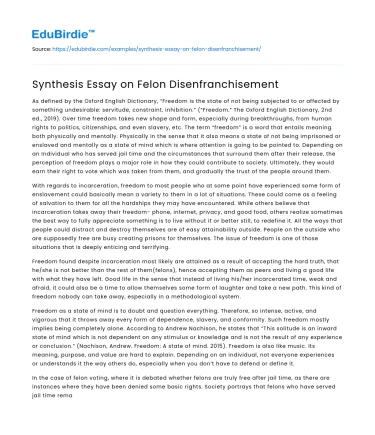As defined by the Oxford English Dictionary, “Freedom is the state of not being subjected to or affected by something undesirable: servitude, constraint, inhibition.” (“Freedom.” The Oxford English Dictionary, 2nd ed., 2019). Over time freedom takes new shape and form, especially during breakthroughs, from human rights to politics, citizenships, and even slavery, etc. The term “freedom” is a word that entails meaning both physically and mentally. Physically in the sense that it also means a state of not being imprisoned or enslaved and mentally as a state of mind which is where attention is going to be pointed to. Depending on an Individual who has served jail time and the circumstances that surround them after their release, the perception of freedom plays a major role in how they could contribute to society. Ultimately, they would earn their right to vote which was taken from them, and gradually the trust of the people around them.
With regards to incarceration, freedom to most people who at some point have experienced some form of enslavement could basically mean a variety to them in a lot of situations. These could come as a feeling of salvation to them for all the hardships they may have encountered. While others believe that incarceration takes away their freedom- phone, internet, privacy, and good food, others realize sometimes the best way to fully appreciate something is to live without it or better still, to redefine it. All the ways that people could distract and destroy themselves are of easy attainability outside. People on the outside who are supposedly free are busy creating prisons for themselves. The issue of freedom is one of those situations that is deeply enticing and terrifying.
Save your time!
We can take care of your essay
- Proper editing and formatting
- Free revision, title page, and bibliography
- Flexible prices and money-back guarantee
Freedom found despite incarceration most likely are attained as a result of accepting the hard truth, that he/she is not better than the rest of them(felons), hence accepting them as peers and living a good life with what they have left. Good life in the sense that instead of living his/her incarcerated time, weak and afraid, it could also be a time to allow themselves some form of laughter and take a new path. This kind of freedom nobody can take away, especially in a methodological system.
Freedom as a state of mind is to doubt and question everything. Therefore, so intense, active, and vigorous that it throws away every form of dependence, slavery, and conformity. Such freedom mostly implies being completely alone. According to Andrew Nachison, he states that “This solitude is an inward state of mind which is not dependent on any stimulus or knowledge and is not the result of any experience or conclusion.” (Nachison, Andrew. Freedom: A state of mind. 2015). Freedom is also like music. Its meaning, purpose, and value are hard to explain. Depending on an individual, not everyone experiences or understands it the way others do, especially when you don’t have to defend or define it.
In the case of felon voting, where it is debated whether felons are truly free after jail time, as there are instances where they have been denied some basic rights. Society portrays that felons who have served jail time remain felons at heart for life. Recent studies have shown that these might not be a thorough response. In 2017, about 12 percent of prisoners released in 30 states were arrested for a new crime within three years of their release from prison. While others may believe there are more of these people committing these crimes but have not been caught, the percentage of those who possibly have taken a new leaf should be given the benefit of the doubt and be able to contribute to the welfare of the country. Also, with respect to the constitution, voting is a right for as long as the felons retain their citizenship in a country. Their rights have no reason to be revoked unless it is a crime determined by the Constitution to be unforgiving or to lose their citizenship. These situations would be the only supported reason why felons could lose their rights.
According to Matt White, the issue of felon voting rights is such a predicament that it has been debated several times at the government level. In his article on felon disenfranchisement & democratic legitimacy he stated, “Other theorists have turned to citizenship theory to criticize existing policies and the disenfranchisement policies have been found to lack justification with the prevailing normative framework.” (Whitt, Matt S. “Felon Disenfranchisement & Democratic legitimacy”). In other words, there is no proof that a released felon who has served jail time is lacking in the necessary virtues to vote. At the same time, the same could also be said for those who have never served jail time. A good question would be why was a prison built, is it to just remove the bad ones from the good ones or to give them another chance at a good life? The prison has proven to have psychological effects on its inmates in the sense that there have been results of people making good turns in their lives.
Although laws, ethics, and cultural conventions restrain us, people who reject those limits such as outlaws, outcasts, visionaries, dictators, and sociopaths cannot let go of the feeling of being free. Hence, there are various roads leading to freedom as a state of mind. It is not limited to just the proclaimed good people but as earlier described, attainable by anyone.
Works Cited
- “Freedom.” The Oxford English Dictionary, 2nd ed., 2019.
- Nachison, Andrew. Freedom: A state of mind. 2015.
- Whitt, Matt S. “Felon Disenfranchisement & Democratic legitimacy.” Social Theory & Practice, vol 43, no. 2, 2017, pp.283-311






 Stuck on your essay?
Stuck on your essay?

